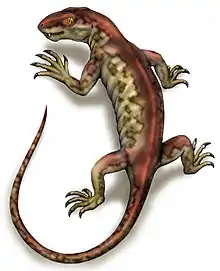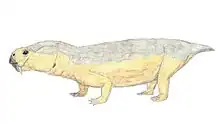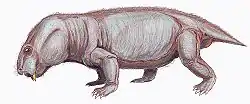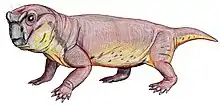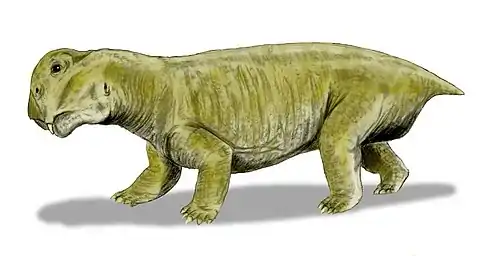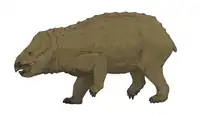| Sinokannemeyeria Temporal range: Middle Triassic, | |
|---|---|
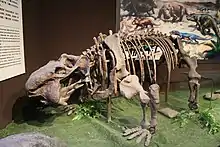 | |
| Mounted skeleton, Paleozoological Museum of China | |
| Scientific classification | |
| Domain: | Eukaryota |
| Kingdom: | Animalia |
| Phylum: | Chordata |
| Clade: | Synapsida |
| Clade: | Therapsida |
| Suborder: | †Anomodontia |
| Clade: | †Dicynodontia |
| Clade: | †Kannemeyeriiformes |
| Genus: | †Sinokannemeyeria Young, 1937 |
| Type species | |
| †Sinokannemeyeria pearsoni Young, 1937 | |
| Species | |
| |
Sinokannemeyeria is a genus of kannemeyeriiform dicynodont that lived during the Anisian age of Middle Triassic period in what is now Shanxi, China.[1][2]
Description
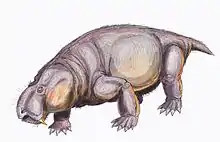
Sinokannemeyeria was about 1.8 metres (5.9 ft) in length and 100 kilograms (220 lb) in weight. It had relatively short, stumpy legs which were held slightly sprawling gait to the sides of its body. The limb girdles were formed into large, heavy plates of bone to support the weight of the wide, heavily built body. Sinokannemeyeria was probably not a fast or agile animal.[3]
The front of the jaw had a small horn-covered beak, and there were two small tusks growing from bulbous projections on the upper jaw. These tusks could have been used to dig up roots.[3] Compared to Kannemeyeria, it had broader snout, smaller temporal fenestrae and lower temporal crests. Sinokannemeyeria may had rather indiscriminately seized and torn vegetation in contrast to the more selective cropping of Kannemeyeria.[4]
Classification
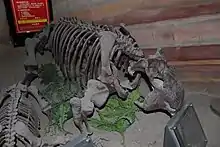
Below is a cladogram from Kammerer et al. (2013):[5]
| Kannemeyeriiformes |
| ||||||||||||||||||||||||||||||||||||||||||||||||||||||||||||||||||||||||||||||||||||||||||||||||||||||||||||||||||||||||||||||||||||||||||||||||||||||
See also
References
- ↑ "Sinokannemeyeria". Fossilworks. Retrieved 17 December 2021.
- ↑ J. Liu. 2015. New discoveries from the Sinokannemeyeria-Shansisuchus Assemblage Zone: 1. Kannemeyeriiformes from Shanxi, China. Vertebrata PalAsiatica 53(1):16-28
- 1 2 Richardson, Hazel (2003). Dinosaurs and Prehistoric Life. London: Dorling Kindersley Limited. p. 48. ISBN 0-7513-3734-X.
- ↑ Lucas, Spencer G. (2001). Chinese Fossil Vertebrates (First ed.). New York: Columbia University Press. p. 110. ISBN 9780231084833. Retrieved 14 March 2020.
- ↑ Kammerer, C. F.; Fröbisch, J. R.; Angielczyk, K. D. (2013). Farke, Andrew A (ed.). "On the Validity and Phylogenetic Position of Eubrachiosaurus browni, a Kannemeyeriiform Dicynodont (Anomodontia) from Triassic North America". PLOS ONE. 8 (5): e64203. Bibcode:2013PLoSO...864203K. doi:10.1371/journal.pone.0064203. PMC 3669350. PMID 23741307.
